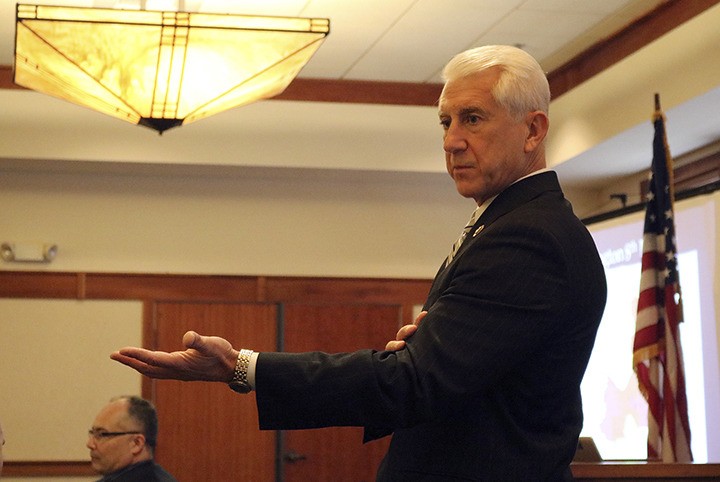U.S. 8th District Congressman Dave Reichert returned to Snoqualmie on Wednesday, Oct. 26, to speak at the Snoqualmie Valley Chamber of Commerce luncheon held at the Snoqualmie Ridge TPC.
At the luncheon, Reichert spoke about three big topics he has been involved with in Congress; trade, tax reform, and police and community relationships.Reichert, the current chairman of the Trade Subcommittee in the Ways and Means Committee, expressed his support for the controversial Trans-Pacific Partnership Agreement (TPP) and how it would allow American companies to become more competitive in international trade negotiations.
“We are trying to balance the playing field out there for our businesses, not just in the agriculture community but also when it comes to high tech, aerospace, financial services, when you talk about banking and insurance, etc.,” Reichert said. “TPP (is) important because of the benefits to the country, specific to Washington State, 40 percent of our jobs are directly tied to trade, trade jobs pay on average about 20 percent higher then non-trade jobs. So if you are talking about raising the minimum wage, this is the way to do it… support trade because those jobs pay better.”
He also said that the TPP contains some of the strongest protections for the environment that have ever been in any trade agreement America has been a part of.
“It’s the strongest language of any trade agreement when it comes to protecting the environment, and when it comes to human rights,” Reichert said. “Our opportunity in trade is not only to economically succeed and provide some national security worldwide, but also build that partnership and trust between the United States and these other countries, so that we can help each together treat human beings better and we can work together to protect our environment.”
Reichert transitioned from trade to tax reform, which are inherently linked, he said.
Reichert, who sits on the Subcommittee on Tax Policy, helped work on a tax reform package that is waiting to be brought to the new administration in January. His goal is to simplify and empower people through the tax reform and to help businesses grow.
Since 1986 there has not been a tax reform, Reichert said. He said that reducing regulations and removing government involvement from the lives of business owners was his goal. Reichert also explained that the tax reform package would reduce corporate tax rates from 38 percent to 20.
“When you talk about the tax code, you can’t compete on a level playing field with corporate rates being at 38 percent. We are lowering the corporate rate to 20 percent from 38 percent,” he said. “You have two and a half trillion dollars of revenue generated by American businesses off-shore, but what we are trying to do is to create a tax code that brings that back. Imagine if that two and a half trillion came back into our economy what that would do for businesses and jobs. It would be a dynamic shot in the arm.”
American businesses don’t bring the money back because they would have to pay the difference between the low tax rate of the foreign country, he said. Reichert’s example was Ireland’s corporate tax rate of 12 to 15 percent, and the American tax rate of 38 percent.
He also spoke about his time putting together a bipartisan group to address the growing discomfort and distrust of police across the country.
One of his goals is to increase grant money to police departments so they can become nationally accredited through non-governmental third party organizations. He said this would improve the hiring and training standards that would lead to more professional behavior and fewer lives lost.
“It’s so easy to focus on the differences. The hard part is to find the positives in each one of us and help each other through this life,” he said. “We are bringing together a lot of ideas to bring police and community back together.”


